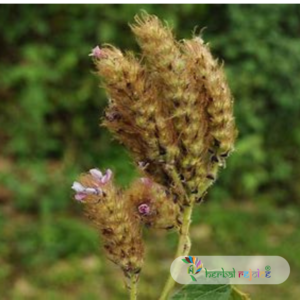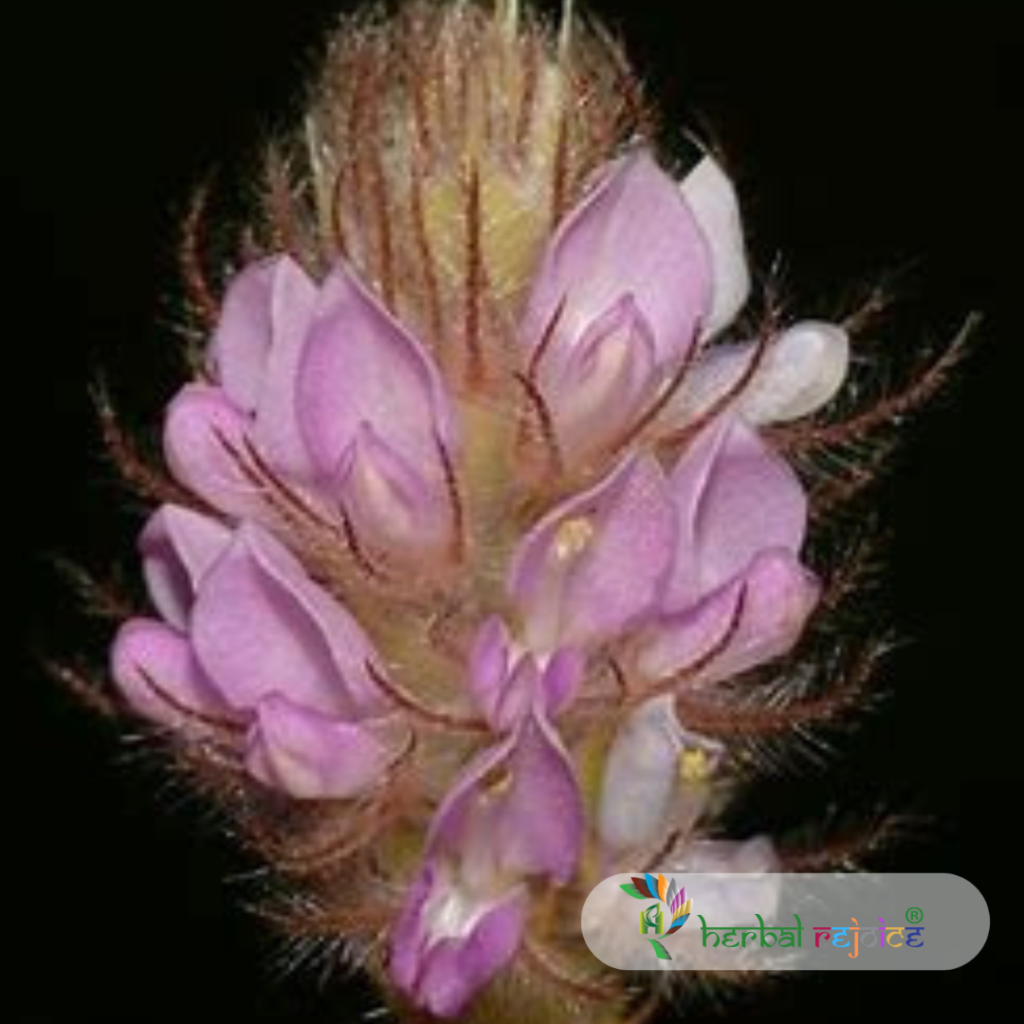Introduction:
Prishniparni, scientifically known as Uraria lagopoides DC., is a flowering plant belonging to the Papilionaceae or Fabaceae family. It is primarily found in the grasslands of Bihar, Orissa, West Bengal, and Palni Hills. In Ayurvedic and Siddha medicine, Prishniparni is highly valued for its medicinal properties and has been used for centuries to treat various ailments. This article highlights the numerous health benefits and traditional uses of Prishniparni, backed by scientific research.
Prishniparni in Ayurveda and Siddha Medicine:
In the traditional Indian medicine systems of Ayurveda and Siddha, Prishniparni is considered a valuable herb. It is often used in combination with another herb called Shaaliparni, and both are attributed to various species of the Uraria genus, including U. lagopoides and U. picta. Prishniparni is known as an excellent anti-catarrhal and alterative, making it beneficial for respiratory and urinary disorders. It is also used to treat intermittent fevers, pulmonary inflammation, and as a recuperating tonic. In addition, its leaves are prescribed in cases of diarrhea.
Traditional Uses and Scientific Research:
Ancient Ayurvedic texts mention Prishniparni as an abortifacient. However, caution and expert consultation are advised before using it for this purpose due to potential risks. Chemical analysis of the plant has revealed the presence of flavonoids, including 5-hydroxy-7,4-dimethoxy flavonol. These compounds contribute to the plant’s medicinal properties and health benefits.
Research studies have explored the pharmacological actions of Prishniparni and provided insight into its therapeutic potential. The hot aqueous extract of the plant’s shoots has shown oxytocic activity, stimulating contractions in both gravid and non-gravid uteri of experimental animals. This property can be potentially beneficial during childbirth. Moreover, the aqueous extract demonstrates anti-implantation activity in rats and exerts a spasmogenic effect on the guts of rabbits and uteri of rats.

Promoting Respiratory Health:
Prishniparni’s anti-catarrhal and alterative properties make it an effective remedy for respiratory disorders. It helps reduce mucus production, clears congestion, and alleviates cough and cold symptoms. Regular consumption of Prishniparni preparations can provide relief from bronchitis, asthma, and other respiratory conditions.
Boosting Immunity:
Prishniparni is known to have immunomodulatory effects, which means it can regulate and strengthen the immune system. Its consumption can enhance the body’s ability to fight off infections, viruses, and other pathogens. Regular intake of Prishniparni-based formulations can contribute to overall immunity and reduce the risk of recurrent illnesses.
Supporting Digestive Health:
In Ayurveda, Prishniparni leaves are often used to address digestive issues like diarrhea. It has antimicrobial properties that can help combat harmful bacteria and parasites in the gut. Additionally, Prishniparni can regulate bowel movements, reduce abdominal discomfort, and promote overall digestive wellness.
Anti-inflammatory and Analgesic Effects:
Prishniparni possesses anti-inflammatory properties that make it valuable in managing various inflammatory conditions. It can help alleviate pain, swelling, and redness associated with inflammatory diseases such as arthritis, gout, and joint pain. Regular use of Prishniparni-based preparations can provide relief and improve overall joint mobility.
Conclusion:
Prishniparni (Uraria lagopoides DC.) is a highly beneficial medicinal herb with a rich history in Ayurveda and Siddha medicine. Its diverse range of health benefits, including anti-catarrhal, alterative, and immunomodulatory properties, make it a valuable addition to natural remedies for respiratory, digestive, and inflammatory disorders. However, it is essential to consult with a healthcare professional before incorporating Prishniparni into your wellness routine to ensure optimal safety and efficacy.
Frequently Asked Questions:
What is Prishniparni?
Prishniparni is a flowering plant scientifically known as Uraria lagopoides DC., belonging to the Papilionaceae or Fabaceae family.
What are the traditional medicinal uses of Prishniparni?
In Ayurveda and Siddha medicine, Prishniparni is used to treat respiratory and urinary disorders, intermittent fevers, pulmonary inflammation, and as a recuperating tonic. Its leaves are also prescribed for diarrhea.
Is Prishniparni safe to use as an abortifacient?
While ancient Ayurvedic texts mention Prishniparni as an abortifacient, caution and expert consultation are advised before using it for this purpose due to potential risks.
What compounds are present in Prishniparni?
Prishniparni contains flavonoids, including 5-hydroxy-7,4-dimethoxy flavonol, which contribute to its medicinal properties and health benefits.
Does Prishniparni have oxytocic activity?
Yes, the hot aqueous extract of Prishniparni shows oxytocic activity, stimulating contractions in both gravid and non-gravid uteri of experimental animals.
Can Prishniparni help with respiratory disorders?
Yes, Prishniparni’s anti-catarrhal and alterative properties make it effective for reducing mucus production, clearing congestion, and alleviating symptoms of bronchitis, asthma, and other respiratory conditions.
Does Prishniparni boost immunity?
Yes, Prishniparni has immunomodulatory effects, which means it can regulate and strengthen the immune system, enhancing the body’s ability to fight off infections and reduce the risk of recurrent illnesses.
How does Prishniparni support digestive health?
Prishniparni leaves have antimicrobial properties that can combat harmful bacteria and parasites in the gut. It can also regulate bowel movements, reduce abdominal discomfort, and promote overall digestive wellness.
Can Prishniparni alleviate joint pain and inflammation?
Yes, Prishniparni possesses anti-inflammatory properties that can help alleviate pain, swelling, and redness associated with inflammatory diseases such as arthritis, gout, and joint pain.
What precautions should be taken before using Prishniparni?
It is essential to consult with a healthcare professional before using Prishniparni to ensure optimal safety and efficacy.
Is Prishniparni widely available?
Prishniparni is primarily found in the grasslands of Bihar, Orissa, West Bengal, and Palni Hills.
Can Prishniparni be used to treat diarrhea?
Yes, Prishniparni leaves are traditionally used to address digestive issues like diarrhea.
What are the pharmacological actions of Prishniparni?
Research studies have shown that Prishniparni has oxytocic, anti-implantation, and spasmogenic effects.
Does Prishniparni have any side effects?
Prishniparni may have potential risks, especially when used as an abortifacient. It is advisable to consult with a healthcare professional before using it.
How can Prishniparni promote overall wellness?
Regular consumption of Prishniparni-based formulations can provide various health benefits, including respiratory support, enhanced immunity, improved digestive health, and reduced joint pain and inflammation.
Can Prishniparni be used by everyone?
It is recommended to consult with a healthcare professional before using Prishniparni, especially for pregnant women, breastfeeding mothers, and individuals with underlying medical conditions.
Are there any studies supporting the medicinal properties of Prishniparni?
Yes, research studies have explored the pharmacological actions of Prishniparni and provided insight into its therapeutic potential.
Is Prishniparni a natural remedy?
Yes, Prishniparni is a natural herb used in Ayurveda and Siddha medicine for its medicinal properties.
How can Prishniparni be consumed?
Prishniparni can be consumed in the form of herbal decoctions, powders, or capsules, following the recommendations of a healthcare professional.


